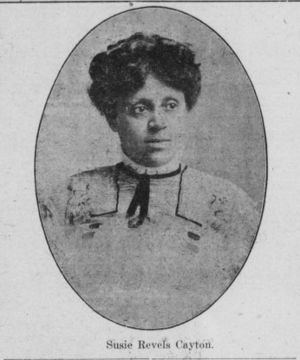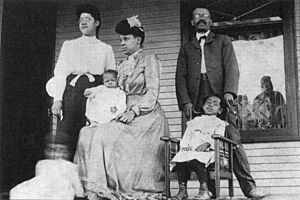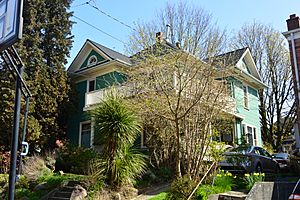Susie Revels Cayton facts for kids
Quick facts for kids
Susie Revels Cayton
|
|
|---|---|
 |
|
| Born |
Susan Sumner Revels
1870 Mississippi, United States
|
| Died | 1943 (aged 72–73) |
| Alma mater | Rust College |
| Occupation | Writer, activist |
| Spouse(s) | Horace Cayton Sr. |
| Children | Horace Cayton Jr., Revels Cayton |
| Parent(s) |
|
Susie Revels Cayton (1870 – 1943) was an important writer, editor, and activist. She was a leader in the Black community in Seattle during the early 1900s.
Contents
Discovering Susie Revels Cayton
Her Early Life and Family
Susie Sumner Revels was born in Mississippi in 1870. This was the same year her father, Hiram Rhodes Revels, made history. He became the first Black senator in the United States. Susie's middle name, "Sumner," honored her father's friend, Charles Sumner. Charles Sumner became a senator from Massachusetts the year Susie was born. Hiram Revels even walked with Sumner at his swearing-in ceremony.
Susie started teaching school when she was 16 years old. In 1889, she began studying at Rust College. She graduated with high honors in 1893. Her degree was in "nurse training." After graduating, she taught at the college for three years. The Revels family had strong ties to Rust College. Her father taught theology there, and her sisters, Ida and Maggie, also went to school there.
A Career in Writing and Journalism
Susie Revels met her future husband, Horace Cayton, in Mississippi around 1881. She was only eleven years old at the time. Horace was dating her older sister, Lillie. After Horace moved to Seattle, he wrote many letters to Susie's father. Susie started adding longer and longer notes to these letters. Soon, she and Horace were writing to each other directly.
After a lot of letter writing, Susie moved to Seattle in 1896. She lived separately until they married in July of that year. She had already started writing for Horace's Seattle newspaper, The Seattle Republican, before she left Mississippi. By 1900, she became the associate editor. She worked at the paper until it closed in 1913. Her husband often traveled, so Susie sometimes ran the entire newspaper herself.
The Seattle Republican was not just a "Black paper." It was a Republican paper edited by a Black person. As Seattle grew, it became harder for African Americans. Fewer white people wanted to read a paper edited by a Black person. This led to problems for the Cayton family. They sold their home in Capitol Hill in 1909. This was partly due to pressure for neighborhoods to be separated by race. They closed The Seattle Republican in 1913.
In 1916, Susie and Horace started a new newspaper called Cayton's Weekly. This paper was for the Black community in Seattle. It ran until 1920. Then, they started Cayton's Monthly, but it only lasted for two issues.
Besides her newspaper work, Susie Revels Cayton also wrote short stories. These stories appeared in The Seattle Republican, Cayton's Weekly, and the Seattle Post-Intelligencer.
Later Years and Activism
In 1919, when Susie Revels Cayton was 49, her family faced money problems. She had to find work to help support them.
When she was in her sixties, she became very active in politics. She joined the Communist Party. Her son, Revels Cayton, introduced her to the group. She became known as "one of the state's most important African American radicals." She joined the Communist Party because of the tough times during the Great Depression in Seattle. She believed that only big political changes could fix money problems and unfairness.
She became friends with famous activists like Paul Robeson and Langston Hughes. Richard Wright also admired her. Langston Hughes even wrote a poem, "Dear Mr. President," dedicated to her.
Susie Revels Cayton moved to Chicago in 1942. This was two years after her husband passed away. She wanted to be closer to her children. She kept working for fair politics and equality until she died in July 1943.
Helping the Community
Susie Revels Cayton was involved in many groups that helped people.
- The Dorcas Club of Seattle: Susie Revels Cayton helped start this club in 1910. It was a group of Black women who worked to make life better in Seattle. They found homes for children who had lost their parents. They also helped widows pay for their living costs.
- Skid Row Unemployed Council: She served as the Secretary for this group.
- Negro Workers Council: She was the Vice President of this council.
Her Children
Susie Revels Cayton and Horace Cayton Sr. had five children. Their two sons, Horace Cayton, Jr. and Revels Cayton, became activists. Their oldest daughter was Ruth. Their second daughter, Madge, was one of the first African American women to graduate from the University of Washington. She became a social worker. They also had a third daughter named Lillie. After Ruth passed away in 1919, they adopted their granddaughter, Susan. They raised Susan as their youngest child.
Lasting Impact
In 1992, the Cayton Scholarship was created to honor both Susie and Horace Cayton. This scholarship helps minority students in Washington state. It supports those who want to work in public relations.
In 1902, Revels Cayton and her husband built a house in Seattle's nice Capitol Hill neighborhood. They lived there from 1903 to 1909. In 2021, Seattle's Landmarks Preservation Board named the house a historic landmark.
Written Works
Susie Revels Cayton wrote several short stories:
- The Part She Played
- Licker
- The Storm
 | Sharif Bey |
 | Hale Woodruff |
 | Richmond Barthé |
 | Purvis Young |



